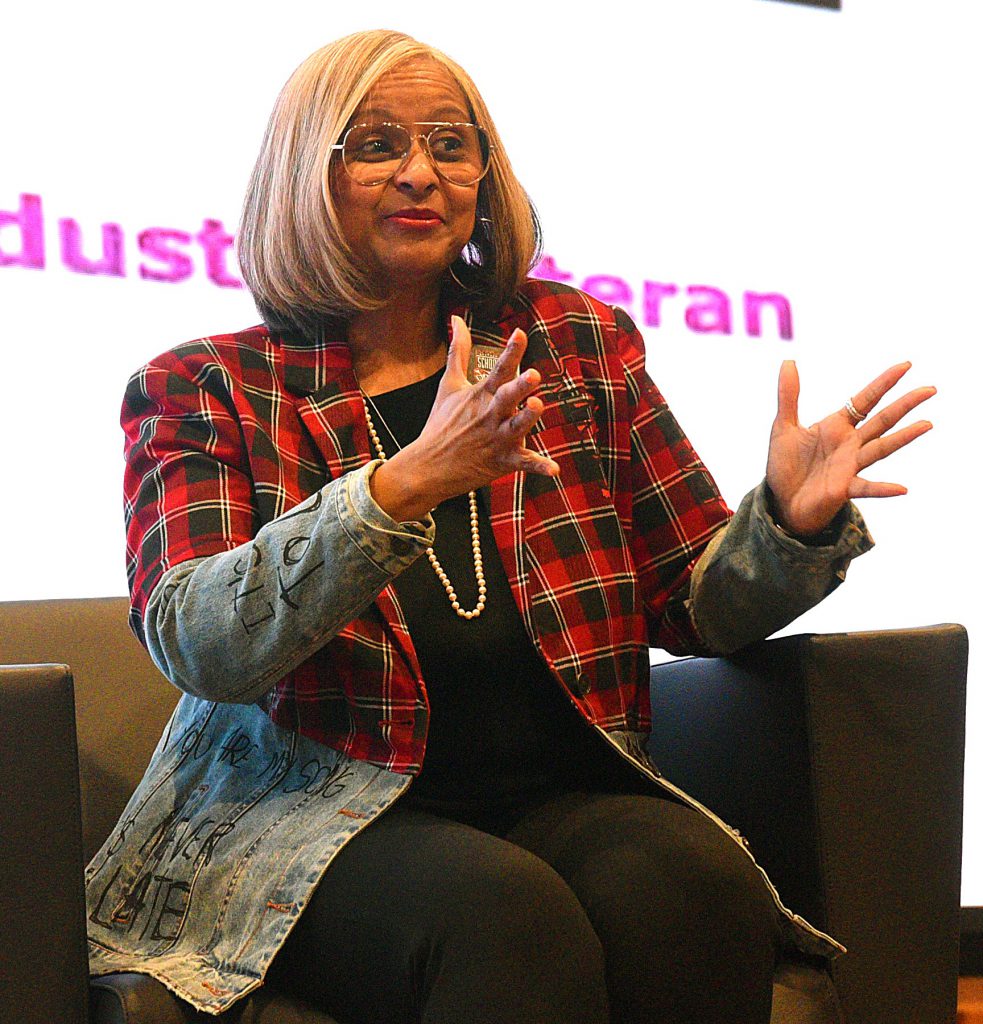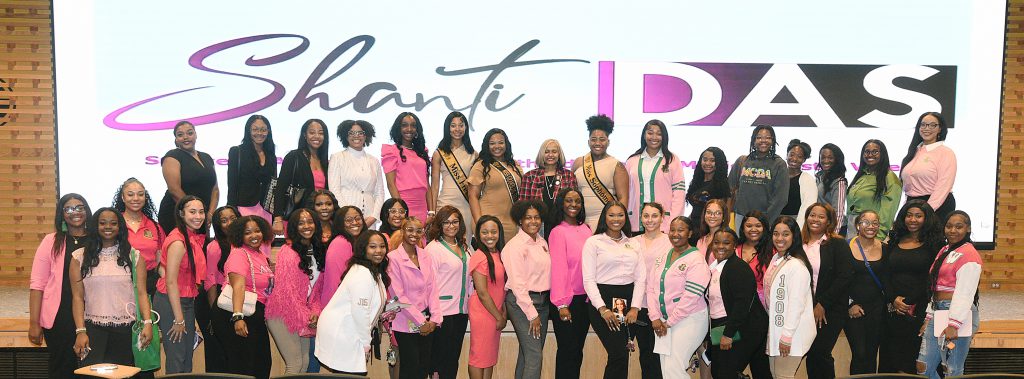Women’s History Month speaker encourages students to cherish life lessons
 Music has played a major role in the life of entertainment executive, entrepreneur, author, and philanthropist Shanti Das.
Music has played a major role in the life of entertainment executive, entrepreneur, author, and philanthropist Shanti Das.
So has silence.
Das spoke during a Women’s History Month program sponsored by Grambling State University’s Campus Activities Student Engagement and The Lyceum Committee inside the GSU Nursing Building Auditorium, discussing her varied career and life experiences while delivering a powerful message about mental health and well-being.
Most recently Das served as Executive Vice President of Urban Marketing and Artist Development at Universal Motown Records, where she managed the marketing campaigns for artists such as Akon, Erykah Badu, and Ashanti.
Over her music career she has also handled promotions of the likes of Outkast, Toni Braxton, TLC, Usher and Run DMC, and considers her time spent as a marketing and tour manager for the late Prince on his “Musicology” one of the best career experiences of her life.
But Das’ life hasn’t always been about good experiences —- she’s seen her share of bad, too.
Das lost her father after he committed suicide when she was only 7 months old. One of her best friends died by suicide in 2014.
And Das later considered suicide.
The obstacles and roadblocks she has faced, and overcome, have been many.
“When I was working in Atlanta, where I grew up, I was making around $100,000 (annually),” Das said. “I worked hard. I earned it. But then that company was sold and I had a choice of moving to New York City or (Los Angeles), so I followed (music executive and producer) L.A. Reed to Arista Records in New York City, and when I got there, they wanted to offer me the same salary I had been making in Atlanta, in New York.
“What happened to the cost-of-living increase and all of that? I knew that some of my male counterparts were making double, way more than I was making. That was the first time I had to learn to fight for myself as a woman in the workplace.”
During her career journey, Das became a proponent of mental health, founding the nonprofit “Silence the Shame,” a campaign dedicated to peeling back the layers of shame and stigma related to mental health.
“The (music) business was wonderful for me,” Das said. “In 2009 I was making nearly half a million dollars a year and had a great office and a Range Rover — all the things I had wanted and had aspired to be.
“But I was hurting on the inside. I was overworked, working 18- to 20-hour days, on and off airplanes, my mother was developing Alzheimer’s, and I was riding in a taxi one day up to Harlem and my whole right side went numb. My entire right side was numb and of course it scared me. So I went to the doctor and had all kinds of tests run and I had developed cervical spinal stenosis that was all stress related.”
That prompted Das to make a life-changing decision.
“I quit my (music) career,” she said. “I think that I had not addressed a lot of trauma with my dad. So I went home to Atlanta and started doing consulting work. Then in 2014 my best friend passed away —- by suicide.
“To say that was hard for me is an understatement. It sent me on a downward spiral, to the point where I came close to contemplating suicide in 2015. I’m not proud of it and hope and pray that no one in this room, or in their family, considers it. My sister and pastor at my church — Ebenezer Baptist, Martin Luther King (Jr.’s) church — convinced me I had to get professional help, and I did.”
That led to Das founding Silence the Shame.

“We’re a nonprofit with about a $1 million a year annual budget,” Das said. We do programming for young adults. We do Parent Cafes, we partner with Jack & Jill America Inc., we partner with the NFL Players Association. We were the NFL’s main partner on mental health from 2020 through the pandemic. We also partner with the NBA and we just launched our Silence the Shame College Ambassador Program.
“That provides leadership training for six months and we had 28 students in our first cohort.”
CLIMB UP College Ambassador Training offers comprehensive support for eligible college students, focusing on personal and professional growth and prioritizing mental well-being and includes virtual and in-person learning sessions to enhance self-awareness, growth mindset, and healthy relationships.
“It’s important you recognize your feelings,” Das said. “Find your person — someone you can talk to. I have my ‘starting five.’ Who’s your starting five — and that’s a great term during NCAA March Madness with five players on a basketball court — but who do you count on for support? It can be a professor, a friend, a student activity director, the counseling center or a family member. But identifying at least five people to take on that role is important.”
Das said one of the most important things she’s learned during her life’s journey is that success is not easy.
“We’ve got the same 24 hours every day,” Das said. “You don’t have 28 hours. You don’t have 30 hours. You don’t have 16 hours. We all have a level playing field with 24 hours in a day. What are you going to do with those 24 hours? How are you going to spend it? Some people might work. Others might not.
“It’s about being intentional. Set some small goals for yourself and know what you want to do. And there are three words you need to remember — time, energy and input. I put my time in — busted my behind — to get into the music industry. I always tried to go into rooms energetically, whether I was having a good day or not. And in life, you get back what you put in, so if you don’t put something into something, how can you expect to get something in return? You have to have input.”
In the end, Das said the key is for an individual to find their own meaning of success.
“Everybody has a different version of success,” Das said. “I’m 53 and have had some good moments and some tough moments. But I still expect to be happy. So I say to you college students — stay energetic, stay happy, stay positive. Just figure out what success looks like to you, because it looks different for everybody. Try to be true to yourself and be real and happy. Not everybody is going to be your friend. I’ve had friends who are no longer in my life. But that’s a success for me, too, because God was protecting me from people I didn’t need in my life or my psyche anymore.
“Success is about being able to accept hard situations and lessons in life. There’s always a lesson in something. It’s about how honest you’re going to be with yourself. It starts with looking in the mirror every single day, being honest with yourself and loving yourself.”

